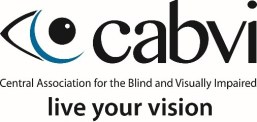
Parenting with Vision Loss
Editorial by Kimberly Scerbo, CABVI Children’s Services Manager
Becoming a parent is an exciting time in a person’s life. Children learn and grow by interacting with their caregivers. Parents who are visually impaired can raise, interact, and play with their children just like a sighted parent. Putting some simple adaptations in place can help.
Many parents with limited to no vision have found great success using alternative techniques by modifying traditional methods to utilize the sense of hearing or touch more than vision. Utilizing other senses is key. One common practice used by parents with visual impairments is to place bells on their child’s shoes or clothing once they become mobile, to ensure they are aware of their child’s movements and location within the home or environment (National Federation of the Blind, 2010).
Using a bell ball or a beeper ball instead of a traditional ball helps parents play ball games with their children. A bell can also be placed in a basketball hoop to allow parents to play basketball with their children (National Federation of the Blind, 2010). Fun games, such as tag or hide and seek, can be played with bells being placed on the child’s shoes or an elastic hairband with bells placed around the wrist.
Adapting materials and games with braille labels also allows parents with visual impairments to play with their children. Board games like Monopoly and Candy Land, and card games, such as UNO and Go Fish, can be adapted by placing braille labels on the game materials. Some popular games have a braille version available to purchase. Connect Four, and other games with numerous game pieces that all feel very similar can be adapted by placing different textures or materials on the pieces. For example, placing a dab of hot glue on all of the black game pieces in the game of Connect Four, and leaving the red pieces as they are, helps to distinguish the two colors.
Reading together is another great way for parents to interact with their children, and is beneficial in developing language and communication skills. Reading also has a positive impact on a child’s cognitive development (Children’s Bureau, 2017). There are a variety of print-braille tactile books available, which allow parents with visual impairments to read to their children or for children to read while parents follow along with the braille. Tactile pictures and objects within books are also great for allowing parents and their children to explore the book together. Print-braille books are available from various organizations such as the American Printing House for the Blind, Seedlings, National Braille Press, and Braille Institute of America.
There’s a variety of specialized equipment that can be utilized, as well as adaptations that can be made, to care for children daily to ensure their needs are met. A talking medical thermometer is beneficial to have when a child is not feeling well, to be able to take the child’s temperature and receive a verbal reading. Large print, talking, or braille labels can be used to label medications. A talking glucometer can also help monitor a child’s blood sugar for children with diabetes. Having a talking indoor/outdoor thermometer is beneficial in assisting parents in determining what type of clothing would be best suited for their children each day. Young children often need assistance picking out their clothing and dressing themselves. Using a color identifier app can assist with this (i.e., Colored Eye, Color Name AR).
Adaptive technology applications, used for identifying objects, labels, print, bar codes, etc. (i.e., Seeing AI) are improving to better meet the needs of the user. This technology, along with various other developments, specialized equipment, and adaptations, can assist parents with vision loss in their daily lives, as they work to raise strong, happy, independent children.
Sighted parents of children with visual impairments may find these suggestions helpful as well. For more information or questions regarding parenting with vision loss or parenting children with visual impairments, please contact Kimberly Scerbo, CABVI Children’s Services Manager, kimberlys@cabvi.org or 315-797-2233, ext. 4019.
References
Children’s Bureau. (2017, March 3). The Importance of Reading to Your Children [Web log post].
National Federation of the Blind (2010). Parenting without Sight: What Attorneys, Social Workers, and Parents Should Know about Blindness. Braille Monitor, 53(10).
Published March 2021